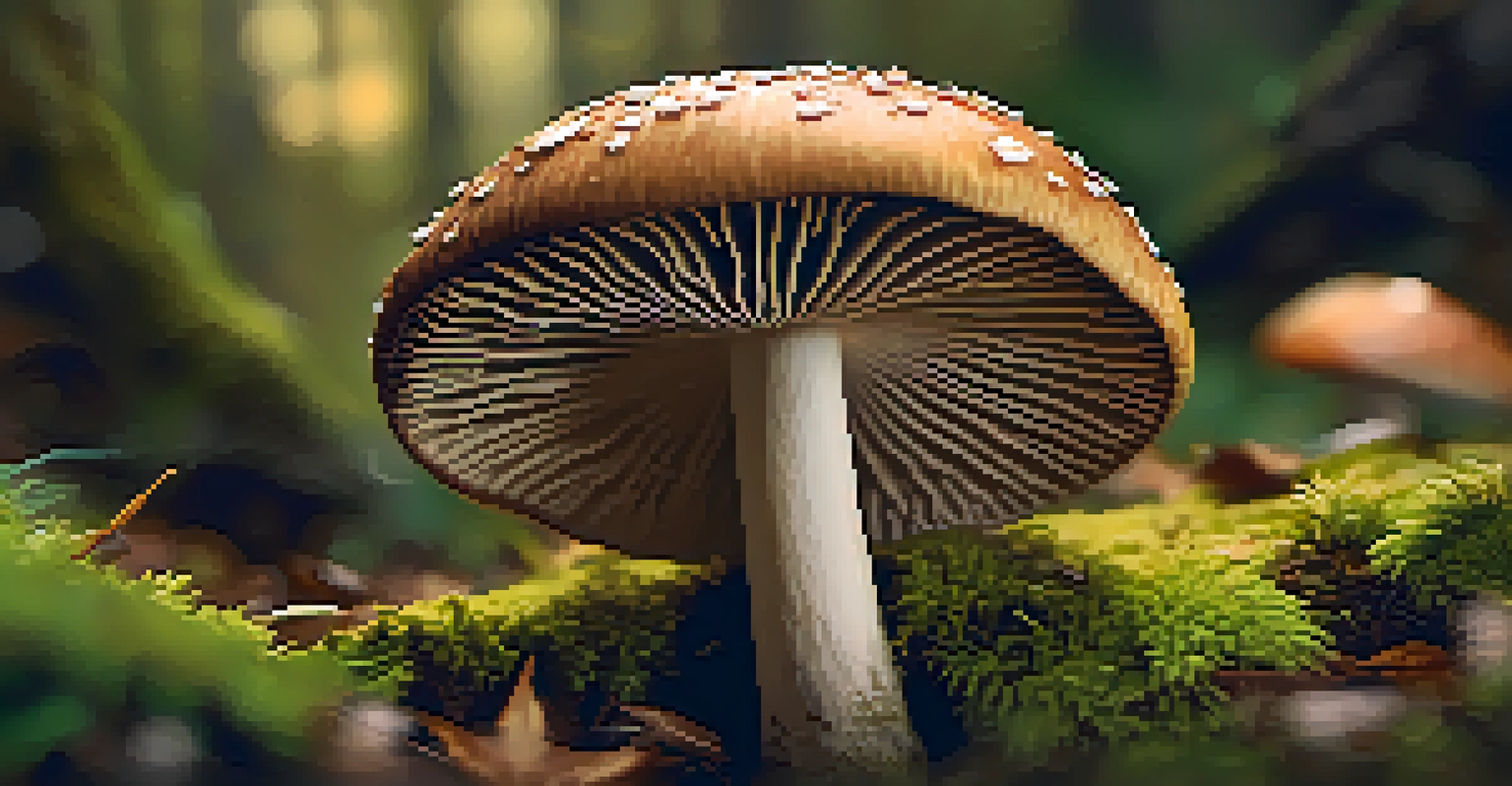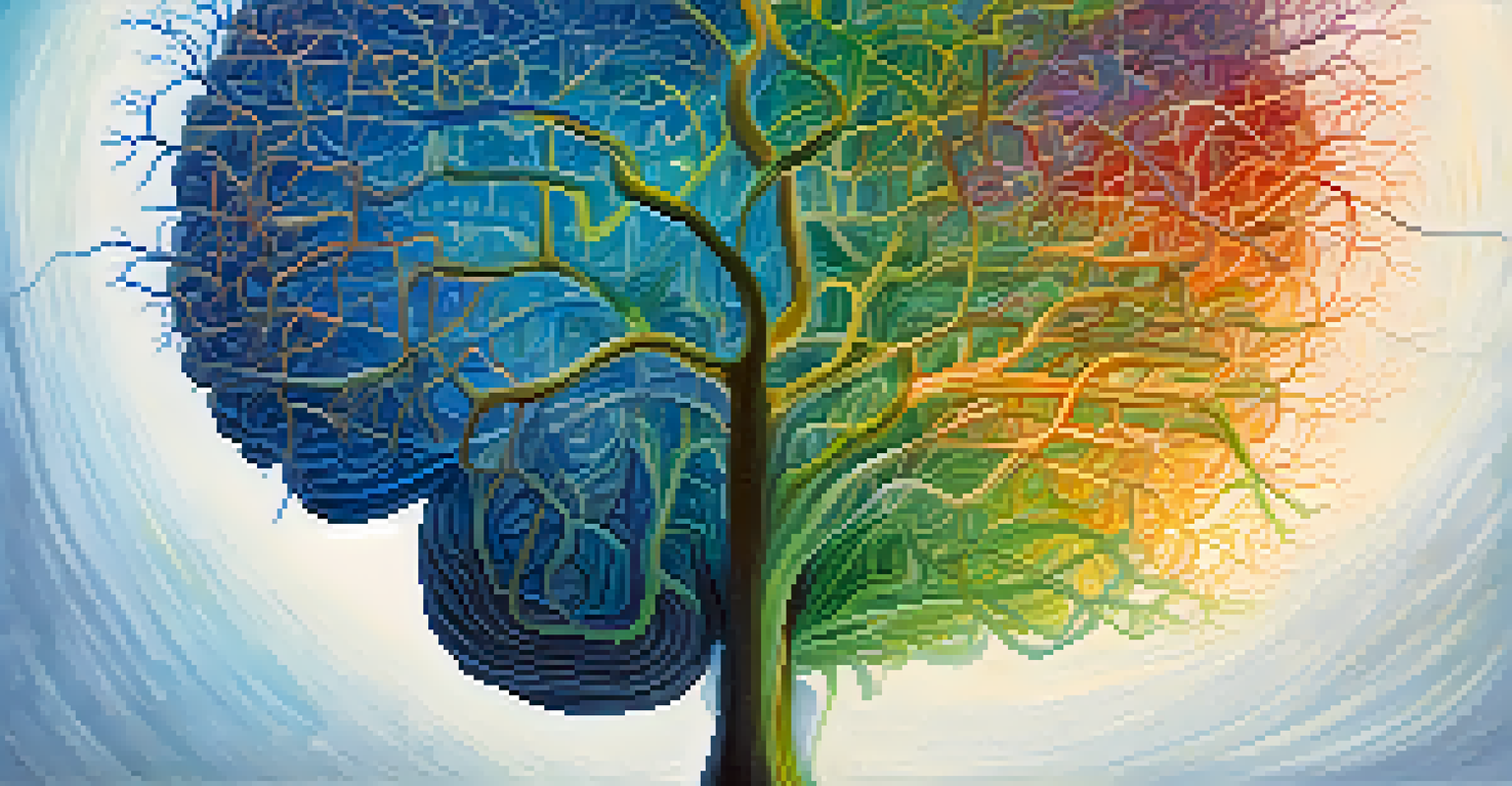Entheogens and Their Impact on Cognitive Functioning

What Are Entheogens and Their Historical Context?
Entheogens are substances that provoke spiritual experiences and altered states of consciousness. Many cultures have used these natural compounds for centuries in rituals and healing practices, from ancient Indigenous tribes to modern therapeutic settings. The term 'entheogen' itself is derived from Greek, meaning 'generating the divine within.' This historical context is crucial as it highlights how these substances have been revered and utilized for personal and communal transformation.
Psychedelics can help us answer fundamental questions about human consciousness and the nature of reality.
Examples of entheogens include psilocybin from mushrooms, ayahuasca from Amazonian plants, and peyote from cacti. Each of these has unique cultural significance and traditional uses that shape our understanding of their effects. For instance, ayahuasca ceremonies often involve guided experiences aimed at healing and self-discovery, emphasizing the communal aspect of these practices. The historical usage of entheogens paints a rich tapestry of human spirituality and cognition.
In recent years, there has been a resurgence in interest from both the scientific community and the public regarding these substances. This revival is not just for recreational use; it's aimed at exploring their therapeutic potential, particularly in treating mental health disorders. Understanding this context sets the stage for examining how entheogens impact cognitive functioning in contemporary society.
Understanding Cognitive Functioning: Key Components
Cognitive functioning encompasses various mental processes, including perception, memory, attention, and problem-solving. These processes are essential for how we interact with the world and make sense of our experiences. For example, when we learn something new, our brain engages multiple cognitive functions to understand and retain that information. Thus, cognitive functioning is the bedrock of our daily lives and decision-making.

Different factors can influence cognitive functioning, such as age, environment, and even diet. Recent studies have suggested that certain substances, including entheogens, may play a role in enhancing cognitive capabilities. The relationship between brain chemistry and cognition is complex, and understanding it can lead to innovative approaches in mental health treatments and cognitive enhancement.
Entheogens and Spiritual Healing
Entheogens have been historically used in various cultures for spiritual experiences and healing practices.
By breaking down cognitive functioning into its components, we can better appreciate how entheogens might interact with and influence these processes. For instance, substances like psilocybin have been shown to affect neural connectivity and promote new pathways in the brain, potentially enhancing creativity and problem-solving skills. This exploration paves the way for a deeper understanding of the cognitive effects of entheogens.
The Science Behind Entheogens and the Brain
Research into how entheogens affect the brain is still in its infancy, but early studies provide fascinating insights. These substances primarily interact with serotonin receptors, particularly the 5-HT2A receptor, which plays a significant role in mood regulation and cognition. By binding to these receptors, entheogens can alter perception and emotional states, leading to profound changes in cognitive processes.
We are not just our biology; we are also our consciousness, and entheogens can help us explore that.
For instance, studies have demonstrated that psychedelics like LSD and psilocybin can increase neural plasticity, which is the brain's ability to reorganize itself by forming new neural connections. This can lead to improved cognitive flexibility, enabling individuals to think more creatively or approach problems from different angles. Imagine the brain as a network of roads; when entheogens are introduced, they might pave new routes, allowing for more efficient travel between ideas.
Furthermore, researchers are exploring the therapeutic potential of these substances in treating conditions like depression, anxiety, and PTSD. By enhancing cognitive functioning and emotional well-being, entheogens may offer a new avenue for mental health treatment, challenging traditional approaches. This intersection of neuroscience and spirituality opens up exciting possibilities for understanding human cognition.
Potential Cognitive Enhancements from Entheogen Use
Many users report enhanced creativity, improved problem-solving abilities, and increased emotional insight after using entheogens. These cognitive enhancements stem from the altered state of consciousness that these substances induce, allowing for a unique perspective on both internal thoughts and external situations. Imagine viewing a familiar landscape from a hot air balloon; the perspective shift can reveal new patterns and connections that were previously unnoticed.
Research has indicated that entheogens can promote divergent thinking, which is the ability to generate multiple solutions to a problem. This creative boost can be particularly beneficial in fields requiring innovation and out-of-the-box thinking. Artists, writers, and scientists have often turned to these substances for inspiration, leading to breakthroughs that might not have occurred otherwise.
Cognitive Enhancements from Use
Users often report enhanced creativity and problem-solving abilities due to the altered states of consciousness induced by entheogens.
However, it's essential to approach these findings with caution. While anecdotal evidence and preliminary studies show promise, more rigorous research is needed to understand the long-term effects and potential risks associated with entheogen use. Balancing the potential cognitive enhancements against these risks is crucial for anyone considering their use for cognitive improvement.
Therapeutic Applications and Mental Health Benefits
The therapeutic applications of entheogens are gaining traction in the mental health field, especially for conditions resistant to traditional treatments. Psilocybin, for example, has shown promise in clinical trials for treating severe depression and anxiety, providing relief where conventional medications have failed. This emerging field of research reflects a growing understanding of the mind-body connection and the potential for holistic healing.
Many participants in studies report not only a reduction in symptoms but also a lasting change in their outlook on life. This transformation often includes increased empathy, emotional resilience, and a greater sense of connection to others. Such benefits highlight the potential of entheogens to facilitate profound personal growth and improved mental health, akin to a reset button for the mind.
Despite the promising findings, it's important to approach entheogen therapy with professional guidance. Controlled environments, such as supervised sessions with trained facilitators, ensure safety and maximize therapeutic benefits. As this area of research continues to evolve, it may reshape how we view mental health treatment and the role of consciousness in healing.
Risks and Considerations in Using Entheogens
While the potential benefits of entheogens are enticing, they are not without risks. Individuals may experience adverse psychological effects, including anxiety, paranoia, or even psychosis, particularly if they have a history of mental health issues. Understanding these risks is essential for anyone considering the use of entheogens, as they can significantly impact cognitive functioning and overall well-being.
Moreover, the setting in which entheogens are consumed plays a critical role in the experience. A safe, supportive environment can help mitigate negative reactions, while an uncontrolled setting may lead to distressing experiences. It's akin to taking a road trip; the journey can be enjoyable with the right company and route but can become challenging if you're unprepared or in the wrong environment.
Therapeutic Potential for Mental Health
Research shows that entheogens like psilocybin may provide new treatment avenues for mental health disorders, particularly where traditional methods fail.
Education and preparation are vital for anyone exploring entheogens, as is the consideration of legality and ethical implications. As the conversation around these substances evolves, a balanced understanding of both their potential and their pitfalls will be crucial for responsible use. This awareness can lead to a more informed approach to integrating entheogens into personal or therapeutic practices.
The Future of Entheogens and Cognitive Research
As interest in entheogens continues to grow, so does the potential for groundbreaking research into their effects on cognitive functioning. Scientists are increasingly recognizing the need for rigorous studies to explore the mechanisms behind these substances and their impact on the brain. This research could unlock new insights into human consciousness and cognition, offering fresh perspectives on creativity, problem-solving, and emotional health.
Moreover, the potential integration of entheogens into mainstream mental health treatment is on the horizon. As clinical trials yield promising results, we may see a shift in how mental health professionals approach therapy, incorporating these substances as viable options for patients. This evolution could revolutionize mental health treatment, paralleling the way we view other forms of therapy and medication.

In conclusion, the future of entheogen research holds exciting possibilities for understanding cognitive functioning and enhancing mental health. As we navigate this uncharted territory, a collaborative approach between researchers, practitioners, and users will be essential to fully grasp the implications of these substances. Together, we can explore the depths of human cognition and the transformative potential of entheogens.